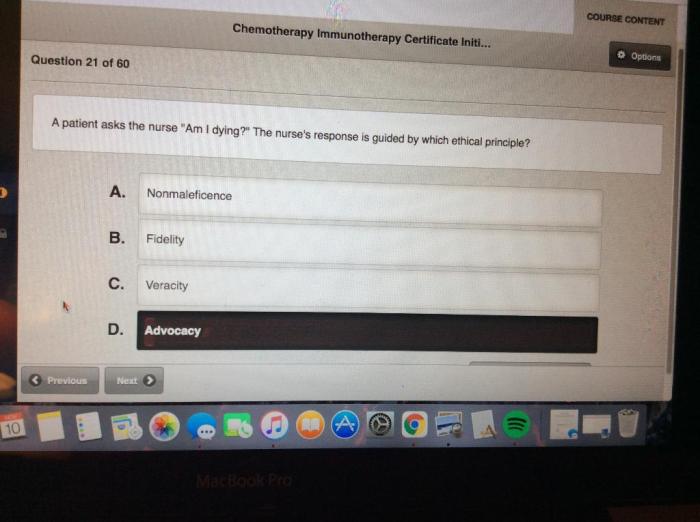Delving into the realm of oncology, this comprehensive guide tackles ONS chemotherapy immunotherapy test questions, providing a thorough exploration of the principles, applications, and considerations surrounding these crucial cancer treatments. Embark on a journey of discovery, unraveling the complexities of chemotherapy and immunotherapy while gaining invaluable insights into their role in cancer management.
This guide will navigate the intricacies of chemotherapy and immunotherapy, empowering you with knowledge and understanding. Explore the diverse range of agents employed in these treatments, delve into their mechanisms of action, and witness the remarkable impact they have on cancer outcomes.
Prepare to be equipped with a deep comprehension of patient considerations, monitoring techniques, and emerging trends in this rapidly evolving field.
Overview of Oncology Chemotherapy Immunotherapy

Chemotherapy and immunotherapy are two cornerstones of modern cancer treatment. Chemotherapy involves the use of cytotoxic drugs to kill cancer cells, while immunotherapy harnesses the body’s own immune system to fight cancer.
Chemotherapy agents can be classified into various groups based on their mechanism of action, such as alkylating agents, antimetabolites, and mitotic inhibitors. Immunotherapy agents, on the other hand, include monoclonal antibodies, immune checkpoint inhibitors, and cancer vaccines.
Common chemotherapy and immunotherapy combinations include regimens such as CHOP (cyclophosphamide, doxorubicin, vincristine, prednisone) for non-Hodgkin lymphoma and FOLFOX (5-fluorouracil, leucovorin, oxaliplatin) for colorectal cancer.
Role of Chemotherapy Immunotherapy in Cancer Management: Ons Chemotherapy Immunotherapy Test Questions
Chemotherapy and immunotherapy play crucial roles in treating various types of cancer, including hematologic malignancies (e.g., leukemia, lymphoma), solid tumors (e.g., breast cancer, lung cancer), and genitourinary cancers (e.g., prostate cancer, bladder cancer).
The efficacy of chemotherapy and immunotherapy depends on factors such as cancer type, stage, and patient characteristics. In early-stage cancers, chemotherapy may be used as a primary treatment to eliminate microscopic disease and reduce the risk of recurrence. In advanced-stage cancers, chemotherapy and immunotherapy may be used in combination to shrink tumors, control symptoms, and prolong survival.
Case studies and research findings have demonstrated the significant impact of chemotherapy immunotherapy on cancer outcomes. For example, the combination of rituximab (an anti-CD20 monoclonal antibody) with chemotherapy has significantly improved survival rates in patients with non-Hodgkin lymphoma.
Patient Considerations for Chemotherapy Immunotherapy

Chemotherapy and immunotherapy can cause a range of side effects and toxicities. These may include nausea, vomiting, fatigue, hair loss, and myelosuppression (low blood counts).
Patient education and informed consent are crucial before starting treatment. Patients should be fully informed about the potential benefits and risks of chemotherapy and immunotherapy, as well as the supportive care measures available to manage side effects.
Managing side effects is essential to improve patient quality of life during treatment. This may involve anti-nausea medications, blood transfusions, and growth factor injections to support blood cell production.
Monitoring and Evaluation of Chemotherapy Immunotherapy

Monitoring the effectiveness of chemotherapy and immunotherapy is crucial to assess treatment response and guide further management.
Imaging techniques, such as CT scans and PET scans, are used to evaluate tumor size and response to treatment. Blood tests can assess tumor markers and monitor blood counts.
Clinical assessments, including physical examinations and patient-reported outcomes, provide additional information about treatment response and patient well-being.
Response criteria, such as RECIST (Response Evaluation Criteria in Solid Tumors) or Lugano criteria, are used to standardize the assessment of tumor response.
Emerging Trends in Chemotherapy Immunotherapy

Advancements in chemotherapy and immunotherapy research are continuously leading to the development of new and more effective treatments.
Targeted therapies, which specifically target cancer cells or molecules involved in cancer growth, are an emerging area of focus. Combination regimens, involving multiple chemotherapeutic agents or the combination of chemotherapy and immunotherapy, are also being explored to enhance efficacy and overcome resistance.
Personalized medicine approaches, tailored to individual patient characteristics and tumor biology, are becoming increasingly important in optimizing treatment outcomes.
Future Directions of Chemotherapy Immunotherapy
The future of chemotherapy and immunotherapy holds great promise for improving cancer outcomes.
Challenges include developing more effective and personalized therapies, overcoming resistance mechanisms, and reducing treatment-related toxicities.
The development of novel immunotherapeutic strategies, such as CAR T-cell therapy and oncolytic viruses, offers potential for further advancements in cancer treatment.
Helpful Answers
What is the significance of patient education and informed consent before chemotherapy and immunotherapy treatment?
Patient education and informed consent are paramount before treatment initiation. Patients must fully understand the potential benefits, risks, and side effects associated with these therapies. This empowers them to make informed decisions about their treatment plan, fostering a collaborative relationship between healthcare providers and patients.
How are the effectiveness and limitations of chemotherapy and immunotherapy evaluated in different cancer stages?
Evaluating the effectiveness and limitations of chemotherapy and immunotherapy in various cancer stages involves assessing tumor response, progression-free survival, overall survival, and adverse events. Clinicians utilize imaging techniques, blood tests, and clinical assessments to monitor treatment outcomes and determine the optimal treatment strategy for each patient.
What are the potential side effects and toxicities associated with chemotherapy and immunotherapy?
Chemotherapy and immunotherapy can cause a range of side effects, including nausea, vomiting, hair loss, fatigue, and bone marrow suppression. Immunotherapy may also lead to immune-related adverse events, such as skin reactions, inflammation, and organ dysfunction. Managing these side effects is crucial to ensure patient comfort and quality of life during treatment.